The Warsaw Uprising created hell on earth. The insurgents fell for the everyday life of the war, the brutality of the Germans, the cynicism of the Russians, the helplessness of the Allies and for the defeat. Because Warsaw paid for its heroism with life, health and property of its inhabitants.
The insurgents brought death and destruction with them. Or at least, this could be felt by civilians, the vast majority of whom were not in the underground and simply wanted to wait for liberation. On Tuesday, August 1, 1944, at 5 p.m., they were suddenly and unexpectedly dragged into a whirlwind of events that, with the force of a hurricane, smashed the entire world around them, bringing death and suffering.
The insurgents could find satisfaction in fighting openly:“Here was one of the fiercest points of the fight. There are houses closer to Grzybowska Street, the ones around us are either empty walls or piles of rubble. The barricades are truly tankproof. Five meters high, bristling with rails and ironwork, and then plunging into a narrow, very deep, perhaps three or four meters, pit. The Ukrainians lost a lot of blood on such barricades, the Germans lost a lot of tanks - and we had more Virtuti and rang ", recalled the insurgent Janusz Rola-Szadkowski.
"From the mine throwers - save us, Lord"
On the other hand, the inhabitants of the capital were more and more mentally exhausted with each week of fighting, and most wanted the horror surrounding them to end. The occupation brought them hunger, scarcity and German terror, but it was only the suppression of the uprising that gave Warsaw and its inhabitants a real hell on earth.
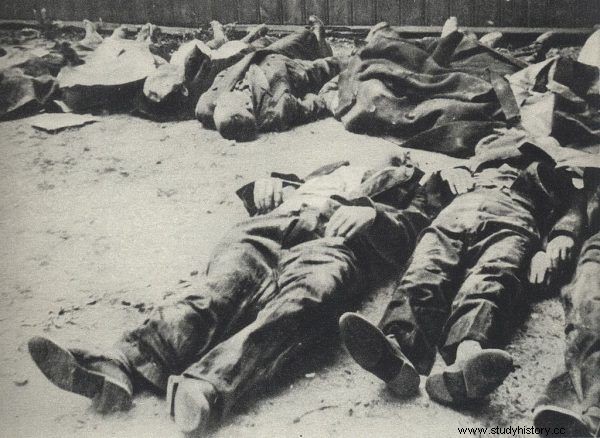
During the uprising, the Germans and their allies committed monstrous crimes against the inhabitants of Warsaw. The photo shows the victims of the Wola massacre.
The beginning of the civil litany of the insurgents, which was created together with his colleague, the poet Miron Białoszewski, proclaimed:
From bombs and planes - save us, Lord,
From tanks and goliaths - save us, Lord,
From bullets and grenades - save us , Lord,
From mine throwers - save us, Lord,
From fires and being burned alive - save us, Lord,
From being shot - save us, Lord,
Death could come in many forms. The Germans and their eastern allies shot Varsovians in gates and squares, often without distinguishing between sex or age, threw grenades into basements where civilians were hiding, robbed people and apartments, raped and murdered women, killed or burned the wounded alive, hung doctors and nurses .
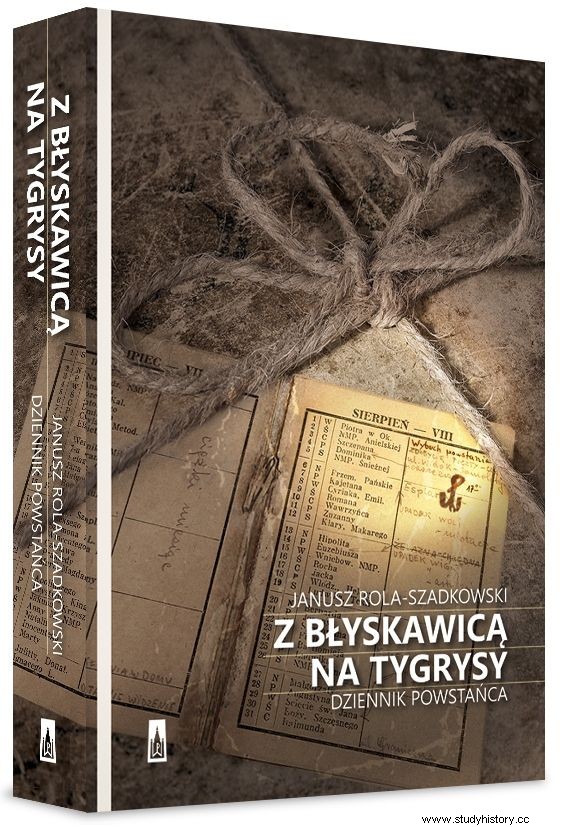
Civilians as human shields
German artillery and aerial bombs, mines, as well as 1.5-tonne 600-millimeter mortar shells, which were able to break through several floors of the tenement house and explode in the basement, fell on the areas affected by the uprising. Churches and hospitals were not spared. Civilians were used as human shields to cover attacking Germans. People going out into the streets were threatened by German pigeon fans and small arms fire. Hunger, thirst, wounds and disease took their toll.
It is estimated that about 150,000 civilians of Warsaw died during the uprising - tens of thousands of them were murdered in Wola, and thousands died in the rubble of cellars in the Old Town. Over 50,000 were sent to concentration camps, 150,000 - to forced labor in Germany. “The rest - mostly the sick, elderly, women and children - were scattered around the Kielce and Kraków regions. These transports took place in very difficult conditions, with hunger and cold, wrote Władysław Bartoszewski. A deserted city was looted and methodically turned into a sea of ruins.
The Warsaw children who went into battle, according to Norman Davies, secured their "permanent place in military history" and the admiration of their countrymen, but the price was terrible. Even the insurgents admitted it. One of them, Mieczysław Kurzyna, admitted:“We always encountered a sunny, laughing and undamaged district first. When we left it, there were debris behind us. ”
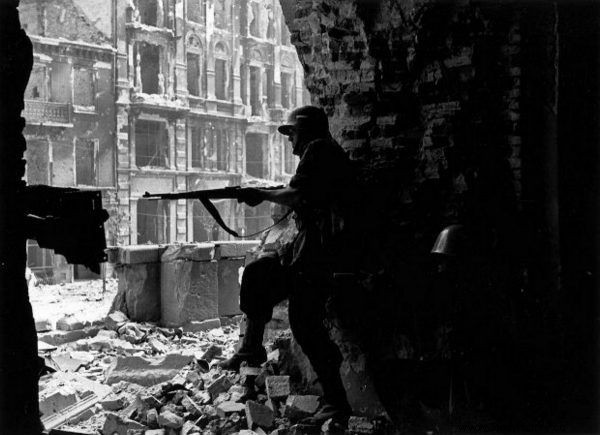
Fierce fighting for each building was tantamount to destroying entire neighborhoods.
In the beginning there was enthusiasm…
When Polish flags suddenly appeared after five years of brutal occupation, the inhabitants were happy. They helped with the construction of barricades, provided first aid to the wounded, extinguished fires, established local governments in tenement houses, organized food, kitchens and help for the homeless. Nobody thought that an ordeal would come soon.
It was not too bad in August. However, the longer the fights lasted, the more food portions decreased, inconveniences and losses increased, the more enthusiasm decreased. Juliusz Wilczur-Garztecki, former counterintelligence officer of the Home Army wrote:
The mood of the population [was] terrible. In the first days of August, the insurgents were greeted enthusiastically, and the girls, to paraphrase Boy-Żeleński's poem, were eagerly ready to crown us with their virtue. After four weeks, the population of Warsaw, harassed by constant fire and air raids, moved to the cellars. The power plant did not work, the water supply was not working (...). Hundreds of thousands of hungry, terrified people crowded into cellars connected by passages pierced between tenement houses.
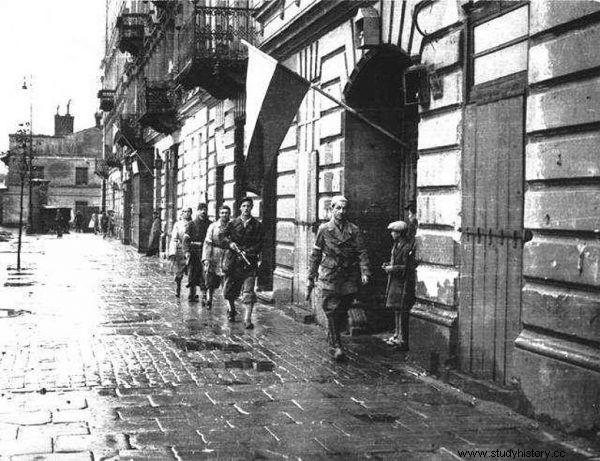
During the first days of the fighting, the insurgents were enthusiastically greeted by Warsaw residents. The situation has changed over time.
The decline of the morale of the Varsovians was closely related to the situation at the front - the loss of each of the districts conquered by the Germans caused a decline in mood. There were no Polish paratroopers, the Red Army, and supplies were dropped rarely and in too small a quantity. There were refugees for that.
Through the streets covered with rubble and glass, barricaded streets are filled with processions of the most unhappy ones. The bag on the back holds all their belongings. They no longer have anything. They do not know where they will spend the night or what they will feed the children with. Driven by bullets, smacked by fire, they go to happier neighborhoods. Despair looks out of their eyes.
This is how the "Information Bulletin" described the reality. In Śródmieście alone, and more specifically in tenement cellars and courtyards, an additional 200,000 people appeared, worsening the already tragic nutritional and sanitary conditions. With them came apathy and discouragement - it was getting harder and harder to get volunteers even to dig people out of buried basements.
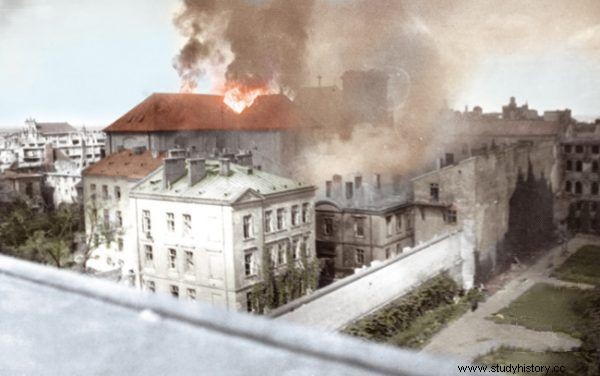
Morale grew worse with each district's loss. In the photo, the burning church of St. Cross.
… then Warsaw hell
A stuffy shelter in a crowded refugee shelter. Fumes from empty buckets. Dirty lairs, bundles, some rags. Garbage around, garbage. Little children cry. Someone is swearing, someone else is complaining. Apart from healthy people - seriously ill with dysentery. Next to the youth - infirm old men, pregnant women. Dirty yard. And here are the homeless. Faces pale, tired. Women's eyes red from crying. Untidy toilets are an excellent breeding ground for epidemic diseases. Lack of water. Hunger.
This is again a quote from the "Information Bulletin". No wonder Juliusz Wilczur-Garztecki added that an underground walk with a white and red armband on the sleeve and a weapon in hand was far from pleasant. Every now and then you could hear shouts:"» Bandits! You bastards! Villains! What have you done with us? «”.
The Home Army itself noticed the growing aversion to the insurgents. One of the reports warned against fire victims and displaced persons:"It is an element completely radicalized, prone to violent actions, critical towards the uprising, civil and military authorities."

Another proclaimed:“The mood of the civilian population of the capital city of Warsaw deteriorates every day, people become apathetic and depressed. They start complaining loudly at the leadership of the uprising, at the Allies and the Soviets. The reasons for this are understandable reasons:the uprising takes too long, no one of the civilians was prepared for it in terms of food or morality. No visible help from the Allies - burnt property, houses. ”
"Go away now. Come what may "
The protracted fights justified the reluctance of civilians, which was agreed by the insurgent and later Speaker of the Sejm Wiesław Chrzanowski:“When the Germans pushed us out of Powiśle, people said:'Go away', 'Let what will happen'. (...) The population of the capital believed that the authorities, when making the decision [to start fighting], did so with some discernment. "
No wonder that general Tadeusz Bór-Komorowski also reported to London:
The civilian population is experiencing a crisis that could have a major impact on the fighting troops. Causes of the crisis:more and more powerful and completely unpunished shelling of the entire area similar to the Old Town, indefinite extension of the fight, smaller and smaller portions of hunger for fire victims and rapid depletion of food for others, high mortality among infants, agitation of hostile factors, lack of water and electricity in all districts .
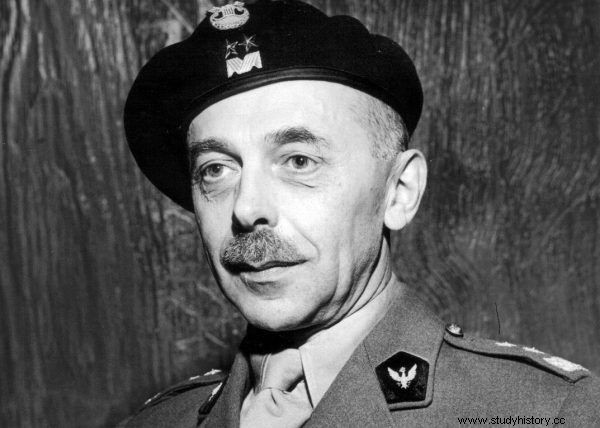
General Bór-Komorowski was aware that the population was turning away from the insurgents.
It is difficult to predict what the massive displacement of people from neighborhoods affected by fire terror and densification in neighborhoods from which there is no way out.
At times, the insurgents themselves provided reasons for their reluctance.
Polish-Polish war for water
In the fighting Warsaw, there was no food, electricity, medicine, it was impossible to use apartments, so they camped in cellars. Hospitals were overcrowded, the dead and the dead were buried in squares, squares and courtyards. What was most troubled, however, was the lack of water. The water supply network was damaged by bombing and artillery fire, and then the Germans closed the filter station. Warsaw residents coped well with digging wells, but the water did not flow as fast as from the tap. It also became a commodity - in September, a bucket of water was offered for several hundred zlotys. The insurgent and later writer Leszek the Prophet saw this problem with his own eyes:
A great conflict has been growing for some time between the civilian population and the military. It's about queues at the wells. (…) The military obviously has priority. This already leads to arguments. It is hardly surprising to someone who waits two or three hours with his bucket that the sight of more and more new kettles from military stoves, being filled outside the queue, upsets him. (…)
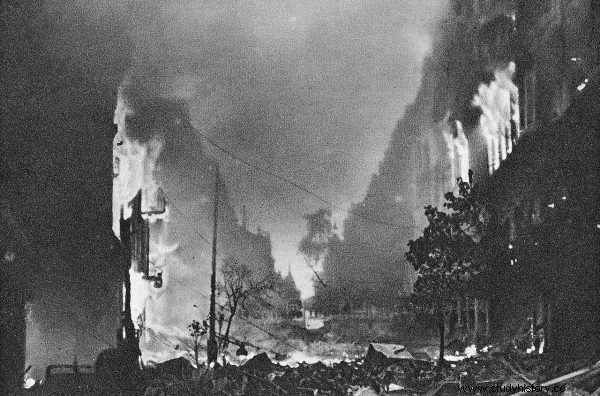
In destroyed Warsaw, water has become a highly scarce commodity. The photo shows burning buildings on Marszałkowska Street.
Today I witnessed the brutal behavior of a few soldiers who, despite the protests of the crowd, pushed their way into the well no differently than the German gendarmes would have done. One even threatened with a gun. (...) In fact, the attitude of the army to the population (...) is often reminiscent of the attitude of the occupying army to the conquered population in recent weeks.
The insurgent authorities also saw this problem. “Our eyes have grown accustomed to the Germanic ways of 'ruling'. Brutality, rudeness, abuse of power - poisoned vapors permeated the Polish air. Is it any wonder that under these conditions some weak heads fell victim to the Nazi plague? ”Asked“ Biuletyn Informacyjny ”on August 25, 1944, enumerating:
"There are people who use fists, whips or clubs in Fighting Warsaw. Women were pushing away with blows of the butt. (…)
There are cases of abuse of human dignity. Crude inventing, raised voice, rudeness towards subordinates (...)
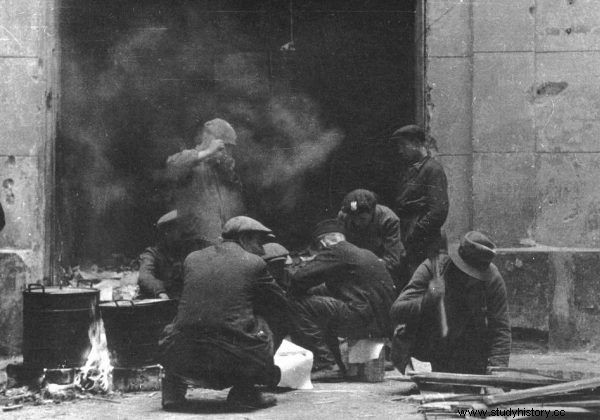
The growing crisis between the insurgents and the civilian population resulted in more frequent scythes. The photo shows the field kitchen lighting.
» I have a gun, I am the authority - so I can do whatever I think is right «. (…)
The exercise of power is also a Germanic venom. People affected by it carry out even the most trivial searches with a pistol in their hand, they can harass even with purely formal identification, they deal with customers in an impertinent-disrespectful manner. "
Hyenas and robbers
The insurgent Warsaw was full of speculators that the Polish military police could not cope with - only in mid-August food prices were 2 to 5 times higher than at the end of July, and then food was sold only for gold coins or jewelry. The abandoned apartments encouraged robbery or requisitioning of property. The insurgent army also had to deal with supply shortages on its own.
"" Szabrowniki "or" Polish army "- only robbers", wrote the insurgent Janusz Rola-Szadkowski about such insurgents. And he gave an example:“There are a lot of people in the yard. In the interior, but only on the ground floor, also in the warehouse. They loot backpacks with vodka, cigarettes and… weapons. A nasty Polish addiction - to plunder ”..

Worse, however, were other cases that the press criticized: " The corpses of the fighters have not yet cooled down, the echoes of the fight have not yet faded, and some dark, cloudy types with sacks, bags, baskets and steal are already crawling out " the insurgent press criticized. And these cases were getting away with the perpetrators.
White flags, treason accusations
Human endurance has its limits, so it is no wonder that when the Polish Red Cross organized the evacuation of civilians in September, about 8,000 people benefited from it, although most preferred to stay in the city rather than rely on the mercy and disfavor of the occupiers. However, at the end of September, civilians were more and more willing to hang white flags themselves, and the insurgents not only saw hostile stares in the cellars, but also heard accusations of treason more and more often.
At the same time, in Żoliborz, the civilian population donated almost 3,500 pieces of clothing and almost 2.4 tons of food to the Home Army soldiers, and on October 4 and 5, the residents of Warsaw said goodbye to the ranks of insurgents going into captivity . . “It's something amazing. Regardless of the tragic mood, the people said goodbye to them in an unbelievable way, ”emphasized Andrzej Krzysztof Kunert.
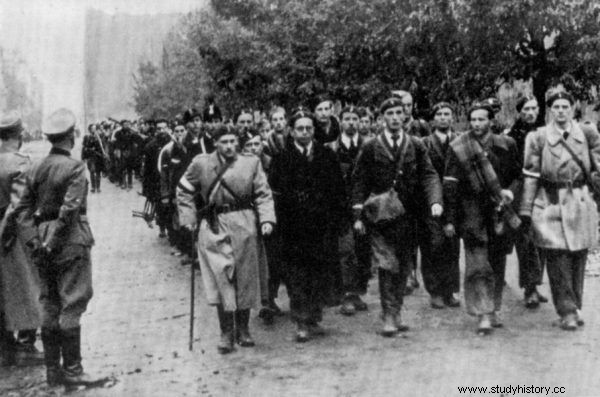
Despite the enormity of suffering, the residents of Warsaw said goodbye to the insurgent units going into captivity.
After the war, only 1/3 of the pre-war inhabitants returned to the ruined city. Despite the terrible experiences, we have not heard many critical opinions about the insurgents from Warsaw residents. Because in People's Poland, paradoxically, this criticism was not easy. The authorities did it, so as Paweł Ukielski assesses:
it was extremely difficult to criticize [the Uprising] in any way without risking the accusation of collaborating with the "regime" - because "all decent people" did not believe the official propaganda, [ so] "had" to be supporters of the Uprising.
And how could it be possible to curse bad behavior of the insurgents in such a case?
Check where to buy “With lightning on the tigers. Insurgent's diary ":
